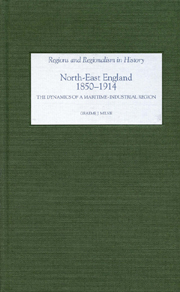Book contents
- Frontmatter
- Contents
- Dedication
- List of illustrations
- Preface
- 1 The North East in time and space
- 2 Horizons: ports, trade and mobility
- 3 Hinterlands and industrial districts
- 4 Making and managing the maritime landscape
- 5 Cohesion and diversity in the maritime urban system
- 6 The horizons of North East shipowning
- 7 Business and the maritime-industrial complex
- 8 Conclusion
- Sources and bibliography
- Index
6 - The horizons of North East shipowning
Published online by Cambridge University Press: 12 September 2012
- Frontmatter
- Contents
- Dedication
- List of illustrations
- Preface
- 1 The North East in time and space
- 2 Horizons: ports, trade and mobility
- 3 Hinterlands and industrial districts
- 4 Making and managing the maritime landscape
- 5 Cohesion and diversity in the maritime urban system
- 6 The horizons of North East shipowning
- 7 Business and the maritime-industrial complex
- 8 Conclusion
- Sources and bibliography
- Index
Summary
This book has stressed the division of the North East's economic and administrative landscapes into riparian and urban spaces, which were themselves arenas in which local interests contested the direction of policy and practice. Many of those interests were business-oriented, either in the shape of individual firms, or of firms grouped in industrial sectors; the task of this chapter and the one that follows is to assess these business-level interactions as part of the wider interplay of forces at work in moulding the North East. The firm is an important actor in any market economy, and, along with its creator, the entrepreneur, plays a complicated role in driving change in society, economy, politics and technology. A firm has many boundaries, depending on the issue in question. The locational distribution of its investors will usually differ from that of its customers, which will in turn be different from the spread of places in which its raw material suppliers operate or its advertising is read; its staff will live somewhere else again. Plotting some of these indicators helps establish the working, everyday horizons of North East business.
This chapter focuses on the shipping industry. On one level, shipping seems the most global and mobile of industries, and yet until recently it remained a very local business in another sense, with shipping firms operating for generations from the same home ports and relying on limited networks of investors.
- Type
- Chapter
- Information
- North East England, 1850–1914The Dynamics of a Maritime-Industrial Region, pp. 139 - 168Publisher: Boydell & BrewerPrint publication year: 2006



